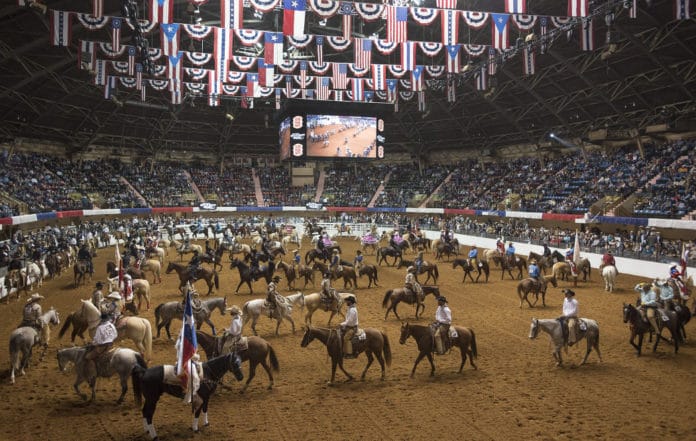Maybe exaggerating a bit, but the Fort Worth Stock Show & Rodeo is going wild.
Going urban wild
By 17 years into its 120-year history, the Stock Show had begun adding multiple livestock shows and related contests for junior exhibitors, the 4-H and FFA kids and teenagers.
But the prime focus remained on domesticated cattle, swine, sheep, goats, poultry and rabbits – and, of course, the always popular horses – plus land forage resources and farm-related mechanics.
This week, though, the Stock Show is debuting a wildlife-focused contest, with 35-40 FFA and 4-H members entered to compete in identifying wildlife species and best management practices and evaluating habitat.
The first Stock Show 4-H and FFA Wildlife Contest will debut at 9 a.m. Monday, Jan. 18. The site is nearby at the Botanical Research Institute of Texas (BRIT), 1700 University Dr.
“We’re going to be on the native prairie, an outdoor area, being developed by BRIT,” said Larry Hysmith, state 4-H natural resources program leader for the Texas A&M AgriLife Extension Service.
Thanks to Texas’ surge in urban growth, ironically, wildlife-focused careers have been multiplying along with increasing youth interest in wildlife/habitat management, Hysmith said.
Urban sprawl has found itself encountering and even nurturing growth of varied wildlife populations in urban settings. So, Hysmith said, there’s a rising need for more educators and urban wildlife management specialists to work with city residents and landowners less savvy than their rural counterparts about land resources and wildlife inhabitants.
Relatively new, the rise in new urban-oriented careers dovetails with a longtime trend of increasing wildlife management positions in state and federal parks, for ranch and farm lands and deer-breeding and -farming ventures. Also pushing demand for expertise has been the state’s flourishing wild (feral) hog population, and the hogs’ costly damage to crops, land and other resources.
“The competitors here will be walking around out there among the native grasses and other vegetation,” Hysmith said. “They’ll be answering questions for each species identified. . . . They’ll also be evaluating habitat (expected results) based on species and management practices and objectives designated.”
“The contest is tailor-made for the Stock Show,” he said, citing the BRIT assets, its plant collections and its native prairie project. The competitors are in two divisions, the juniors at ages 8-13 and seniors at 14-19, and they will have to use their knowledge and their reasoning, visual observation and analytical skills.
The contest makes sense, Stock Show officials said, because of the decades-long evolution of Texas hunting, fishing, birding and other outdoor pastimes into a multimillion-dollar industry for farmers, ranchers and both landowners and tenants. In some Texas areas, ranchers and landowners and tenants earn far more income from leases, rents, fees and services tied to the land’s wildlife resources than from raising livestock.
The Fort Worth show is not the first Texas stock show to feature a wildlife contest. Houston, San Antonio and San Angelo shows and the State Fair of Texas in Dallas already host their versions.
Wild on boosting bids
Some longtime show lovers will suggest the Stock Show has been going wild since 1980, as younger generations of area business operators have flocked to the annual auction to bid increasingly super-higher premium prices for (now about 300) winning and not-so-winning market steers, hogs, lambs and goats led by youthful exhibitors (the juniors).
Winning bids have soared over the past 36 years, reaching well beyond $200,000 for the grand champion steer, and last year’s reserve grand champ sold for $150,000. The total 2015 sale topped $3.7 million.
Among the bidding troupes expected to return this year at the Feb. 6 Junior Sale of Champions are the 140-member Fort Worth Stock Show Syndicate, founded in 1980, and the much newer 170-member and rising Women Steering Business group, debuting at the 2013 Stock Show. Both groups also have non-member contributors and sponsors.
The groups’ leaders say they expect to spend more this year for the 4-H and FFA members’ sale entries, with the Syndicate rising from nearly $3.35 million total last year and Women Steering rising from last year’s $210,000.
“There’s going to be a lot of money in that arena,” said Becky Renfro Borbolla, Women Steering founder and (Fort Worth-based) Renfro Foods vice president.
A large share of those dollars are bound for college education funds, according to sellers, buyers and sellers’ parents alike.
Plus, designated college scholarships – from all sources, including the Stock Show, Syndicate and others – approached $700,000 last year.
Botanical Research Institute of Texas
www.brit.org/






